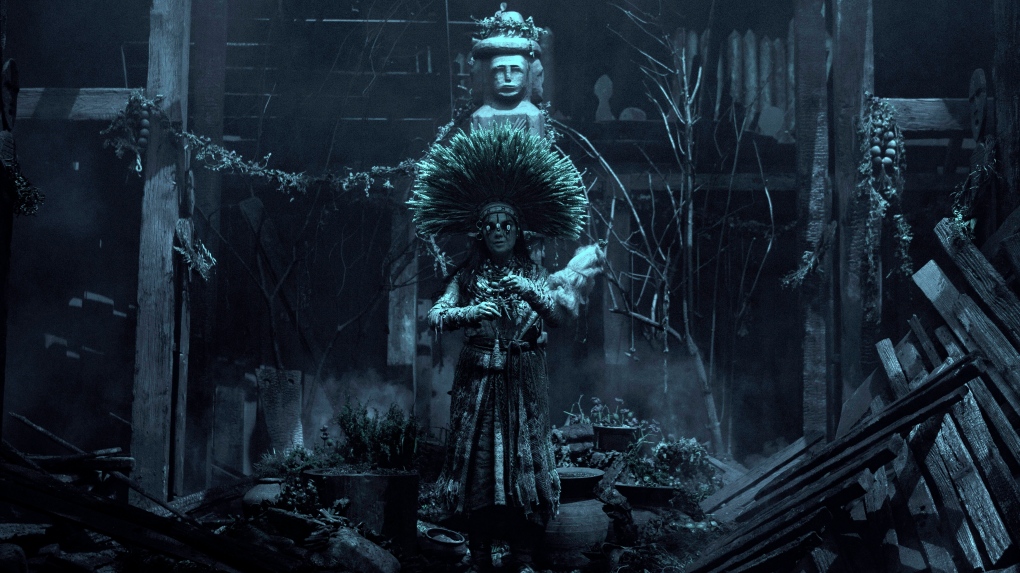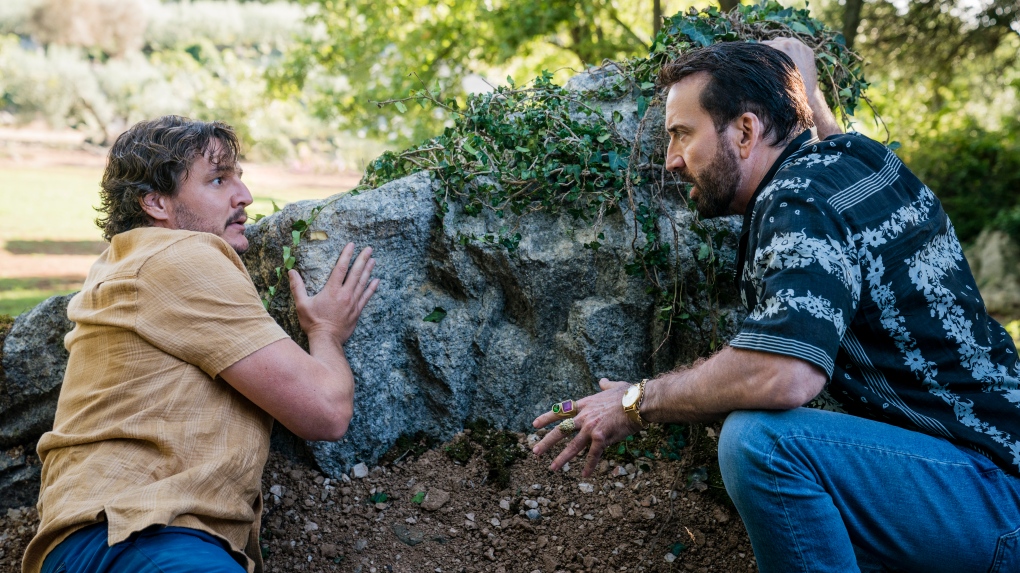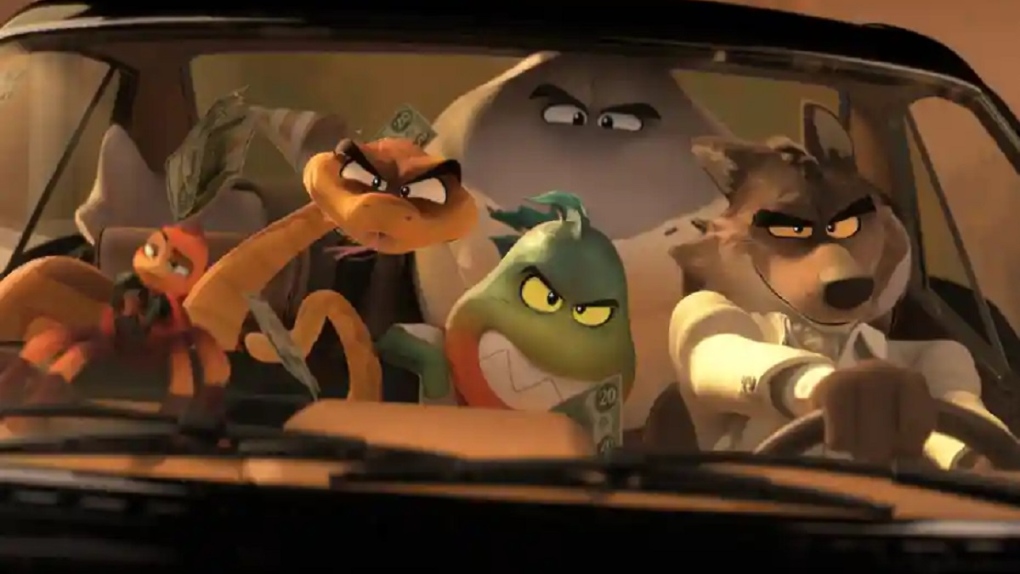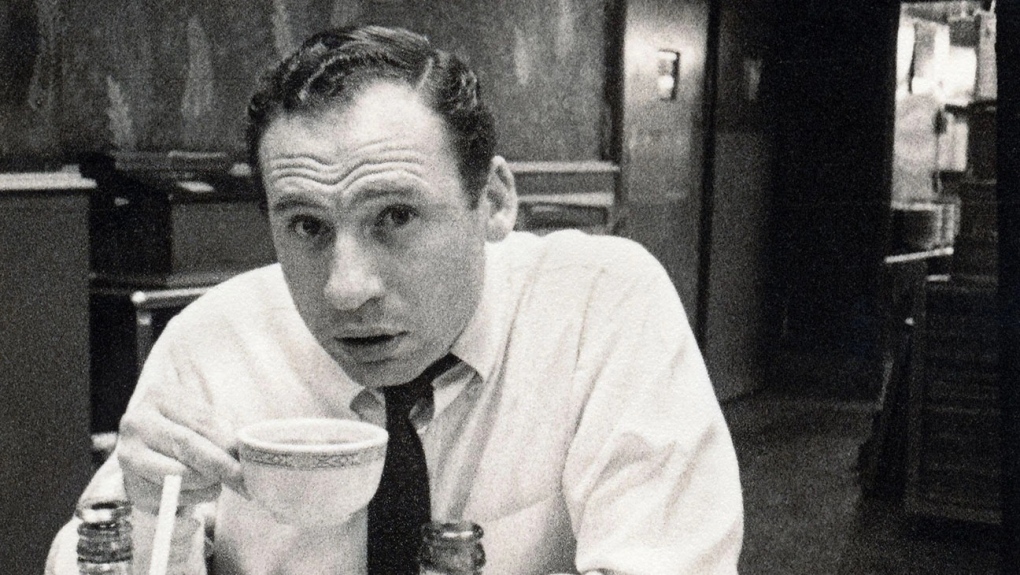
NEW Toxic forever chemicals in drinking water: Is Canada doing enough?
As the United States sets its first national limits on toxic forever chemicals in drinking water, researchers say Canada is lagging when it comes to regulations.
 This image released by Focus Features shows a scene from "The Northman." (Aidan Monaghan/Focus Features via AP)
This image released by Focus Features shows a scene from "The Northman." (Aidan Monaghan/Focus Features via AP)
Robert Eggers is an idiosyncratic filmmaker whose previous films, “The Witch” and “The Lighthouse,” have more in common with silent era movies and formal stage presentation than they do with the blockbusters that rule today’s box office. His latest, the violent Viking drama “The Northman,” now playing in theatres, has all the hallmarks of Eggers’ work, but despite the inclusion of Old Norse language, mysticism and its occasionally psychedelic tone, it may be his most accessible movie yet.
When we first meet Amleth, the Viking warrior prince, played as a teen by Oscar Novak, as a muscle-bound adult by Alexander Skarsgard, it is the year AD 895 somewhere in the North Atlantic. He is a child about to enter the line of succession to one day take over from his father, King Aurvandill (Ethan Hawke).
An unspeakable act of betrayal interrupts Aurvandill’s plans for the future, forcing Amleth to flee the only home he has ever known, leaving behind his mother Queen Gudrún (Nicole Kidman).
Years pass. Adult Amleth is now a fierce warrior with revenge on his mind. When the would-be prince and his band of berserkers ravage a village, the locals who survived the carnage are sold off as slaves. When Amleth learns the purchaser is the man who betrayed his father, he disguises himself as one of the prisoners with a plan to get close to the man who destroyed his life and family, and earn back his honour. “I will haunt this farm like a corpse returned from the grave,” he declares.
On the journey he meets Olga of the Birch Forest (Anya Taylor-Joy), a sorceress who becomes his ally and love interest. “You are still a beast cloaked on man flesh,” she tells him. His strength, she says, will break their bodies. Her cunning will break their minds.
Amleth’s journey is also a spiritual one, driven by mysticism and the words of a whispering seeress played by Björk. “Remember for whom you shed your last teardrop,” she says, sending him off on his mission. Eggers seamlessly blends the supernatural and nature until the lines blur into one trippy whole.
“The Northman” is based on the Scandinavian legend that influenced William Shakespeare‘s beloved “Hamlet.” It’s a familiar story of payback; it's violent, visceral and vengeance-filled, but Eggers’ singular vision, and fondness for pathetic fallacy, ancient symbolism and psychedelia, make it a unique experience.
And don’t forget the violence. So much violence.
Amleth chews one man’s neck, killing him in memorable, bloodthirsty fashion, and that is before the revenge story comes into play. Eggers amps up the brutality, shooting long scenes in unbroken wide shots that provide full few of the action. This ain’t Michael Bay’s frantic cut and paste. It’s full coverage, carefully orchestrated violence that drives home the brutality of the battles. It’s ferocious, audacious—check out the showdown at the Gates of Hell—if occasionally unpleasant, stuff.
It's not all fun and bloody games, however. The storytelling gets bogged down from time to time and Amleth’s frequent vocalizing of his mission mandate—avenge his father, kill his uncle and rescue his mother—gets old after a while.
Having said that, “The Northman” more than delivers on the director’s pure, primal cinematic vision. To Valhǫll!
 This image released by Lionsgate shows Pedro Pascal, left, and Nicolas Cage in a scene from "The Unbearable Weight of Massive Talent." (Katalin Vermes/Lionsgate via AP)
This image released by Lionsgate shows Pedro Pascal, left, and Nicolas Cage in a scene from "The Unbearable Weight of Massive Talent." (Katalin Vermes/Lionsgate via AP)
There is perfect casting and then there is Nicolas Cage, playing a heightened version of himself in “The Unbearable Weight of Massive Talent,” a meta new action comedy now playing in theatres.
Off screen, Cage is a larger-than-life character, an Oscar winner known for his penchant for purchasing dinosaur skulls, tax troubles and wildly uneven cinematic output. He brings the weight of that public persona to this movie, making myth out of his own legend of self-indulgence.
Cage plays Cage as a faded Hollywood prince. Once a box office draw, he’s down on his luck, going broke and in need of a big money gig. He has become the White Claw of serious actors. He’s good, but no one with taste is taking him seriously.
Producers, scared off by his wild-at-heart reputation, give him the Hollywood kiss off. We love you, but are going in a different direction.
Depressed, he decides to leave Hollywood. “I’m done,” he says. “I’m quitting acting. Tell the trades it was a tremendous honour to be part of storytelling and myth-making.”
Before he leaves the life, he gets an offer he can’t refuse. Olive magnate Javi Gutierrez (Pedro Pascal) will pay Cage $1 million to attend his birthday bash in Mallorca. The actor reluctantly agrees, and soon finds himself drinking and cliff-diving at Javi’s beautiful estate.
Javi is a huge fan, with a collection of Cage collectibles. “Is this supposed to be me?” Cage asks, gesturing at a statue of himself. “It’s grotesque. I’ll give you $20,000 for it.”
Turns out the star struck Javi isn’t what he appears. “Do you know who you’re spending time with?” CIA agent Vivian (Tiffany Haddish) asks Cage. “He’s one of the most ruthless men on the face of the Earth.”
They think Javi kidnapped the daughter of the president of Catalonia to influence an upcoming election.
Vivian and Agent Martin (Ike Barinholtz) recruit Cage to work undercover on Javi’s estate to get to the bottom of the case. “That little girl doesn’t have anyone,” says Vivian, “And if you leave, I don’t know what will happen to her.”
It's a chance to do some good, but for Cage, it is also the role of a lifetime.
“The Unbearable Weight of Massive Talent” is an entertaining, oddball movie. Essentially a one joke premise—i.e.: Cage as Cage—it plays with the tropes of many of Cage’s films, but doesn’t play as strictly homage or satire. It’s something else. What, exactly, I’m not quite sure.
It’s almost as if this is Nic Cage’s screw you to the folks who deride him for being a working actor who pumps out two or three movies a year. “I’ve always seen this as a job, as work,” he says, as though he feels bogged down by the weight of the critical appraisal of his artistic choices.
But this isn’t a movie about score settling. It’s a silly, action comedy, unabashedly interested in entertaining the audience. It occasionally errs, mistaking familiar references from Cage’s filmography for jokes. It’s that “meme-ification”—the pinpointing of Cage call-backs—of the film’s humour that prevents it from becoming a knee slapper all the way through. There are laugh out loud moments, but there are more moments that feel more Instagram ready than cinematic.
Still, “The Unbearable Weight of Massive Talent” is a good time, worth the price of admission to see young Cage advising older Cage and commit the most surreal example of actorly self-love ever seen on film.
 A scene from "The Bad Guys." (Photo courtesy DreamWorks Animation)
A scene from "The Bad Guys." (Photo courtesy DreamWorks Animation)
“We may be bad,” says Wolf, in “The Bad Guys,” a new Dreamworks animated heist flick now playing in theatres, “But we are so good at it.”
Wolf, voiced by Sam Rockwell, leads a criminal organization of anthropomorphic animals, safecracker Snake (Marc Maron), master of disguise Shark (Craig Robinson), an apex predator of a thousand faces Piranha (Anthony Ramos), a loose cannon with a short fuse and eight-legged tech wizard Tarantula (Awkwafina), who use their frightening reputations to strike fear into the hearts of their victims.
“Do I wish people didn’t see us as monsters?” asks Wolf. “Sure I do, but these are the cards we were dealt so we might as well play them.”
The gang is riding after a particularly daring bank robbery, but the wind is taken out of their sails when Governor Diane Foxington (Zazie Beetz) shames them during a press conference, calling them second-rate hacks, driven by anger, not intelligence. “They have all the classic signs of a crew in decline,” she says.
Her televised insults push the Bad Guys to plan the ultimate heist, the theft of the Golden Dolfin, a priceless award given to philanthropists and do-gooders. This year it will be awarded to Professor Marmalade (Richard Ayoade), a hamster with a heart of gold.
When their heist goes sideways, Professor Marmalade, from the goodness of his heart, makes a deal with the Bad Guys and the Governor. He will teach the reprobates to use the skills they developed being bad, to be good.
“Being good,” he says, “Just feels so good and when you are good, you are loved.”
Question is, can the Bad Guys be rehabilitated, or is it time to take the “walking garbage” to the trash and lock them up forever?
Based on the New York Times best-selling graphic novel series by Australian author Aaron Blabey, “The Bad Guys” is kind of like “Ocean’s 11,” but for kids. The emotional undercurrents that Pixar weaves into their movies are missing, replaced with a snappy, stylish story that is more swagger than substance. The movie’s singular message—don’t judge a book by its cover—is a good one for kids, but it is hammered home with the subtly of a Don Rickles one-liner. It’s a movie about not accepting stereotypes, that is ripe with stereotypes.
The animation is stylish, but not as sophisticated as we’ve come to expect from big screen offerings like this. Wolf’s fur is rudimentarily rendered and the overall look doesn’t have the zip of Pixar or other computer-generated films.
Having said all that, “The Bad Guys” succeeds through sheer strength of the characters and the humour in Etan Cohen and Hilary Winston’s witty script. There are silly characters kids will get a kick out of, like the flatulent piranha, coupled with jokes parents will appreciate.
Despite its shortcomings, in the end, “The Bad Guys” does good for the audience.
 Mel Brooks is pictured in a scene from "The Automat." (Carl Reiner/Courtesy of A Slice of Pie Productions)
Mel Brooks is pictured in a scene from "The Automat." (Carl Reiner/Courtesy of A Slice of Pie Productions)
A new documentary, “The Automat,” directed by Lisa Hurwitz and now playing in theatres, is an evocative look back at a time when you could get a square meal for a round quarter.
For more than 50 years, Horn & Hardart automats fed more Americans than any other restaurant chain. For the price of a nickel you could get a cup of strong coffee, poured from a spout shaped like a dolphin. The rest of the menu was housed behind small doors with windows that displayed the wares, like baked beans, chicken pot pies, creamed spinach or U.S. Secretary of State Colin Powell’s favourite, macaroni and cheese. Pop a coin in the slot, open the door, and lunch or dinner is served.
“The Automat” uses talking heads, like Mel Brooks, Ruth Bader Ginsburg and Elliott Gould, and archival footage to create a nostalgic look at a by-gone institution, but to also contextualize the contributions the quirky restaurants made to American society.
A precursor to fast food chains like Burger King or Arby’s, both of whom would later fall under the Horn & Hardart umbrella, the automats were a sensation. The first Horn & Hardart automat opened in 1902 in Philadelphia with a strict adherence to quality and egalitarianism. For the next 89 years—the last New York Horn & Hardart automat closed in April 1991—everyone was welcome with no racial barrier, tables were shared by strangers and, at their heyday in the 1940s and 1950s, they served upwards of 350,000 customers a day in New York alone.
Everyone interviewed raves about the food and the restaurants. Starbucks CEO Howard Schultz talks about how a visit to Horn & Hardart sparked his love of the hospitality business, and how it influences him today. Powell remembers family outings and the delicious pies that were a once-a-week treat.
As glowing as the interviews are, there is often a sense of nostalgic melancholy about the demise of the automat—a victim of changing times—as an example of how the good old days, represented by the elegant and welcoming restaurants, are truly behind us.
“It had some style and it was different,” says self-serve automat superfan Mel Brooks. “The marble, the brass, the polished floors, the chatter, the coffee. That was the automat. It can’t work again because the logistics and economics of today won’t allow anything that simple, naive, elegant and beautiful to flourish again.”
“The Automat” is a quickly paced, interesting and affectionate populist documentary that brings to life how, for a time, happiness could be bought for the price of a cheap cup of Joe.

As the United States sets its first national limits on toxic forever chemicals in drinking water, researchers say Canada is lagging when it comes to regulations.
Drivers in Eastern Canada face a big increase in gas prices because of various factors, especially the higher cost of the summer blend, industry analysts say.
The journey to home ownership can be exciting, but personal finance columnist Christopher Liew warns about the trappings of becoming 'house poor' -- where an overwhelming portion of your income is devoured by housing costs. Liew offers some practical strategies to maintain better financial health while owning a home.
A Winnipeg woman was sentenced to house arrest after a single date with a man she met online culminated in her harassing him for years, and spurred false allegations which resulted in the innocent man being arrested three times.
Calgary police have arrested a man and a charge is pending in connection with the death of a toddler in 2022.
New archeological investigations in Guatemala reveal that the ancient Maya people had a ritual of burning royal human remains as a public display of political regime change.
Almost 7,000 bars of pure gold were stolen from Pearson International Airport exactly one year ago during an elaborate heist, but so far only a tiny fraction of that stolen loot has been found.
It took years for Vinnie Deluca to collect more than 400 cards worth of free McDonald's McCafe coffee, a collection that now has "zero value" after the company discontinued the program.
Prince William will return to public duties on Thursday for the first time since his wife Kate revealed she was undergoing preventative chemotherapy for cancer.

When Les Robertson was walking home from the gym in North Vancouver's Lower Lonsdale neighbourhood three weeks ago, he did a double take. Standing near a burrow it had dug in a vacant lot near East 1st Street and St. Georges Avenue was a yellow-bellied marmot.
A moulting seal who was relocated after drawing daily crowds of onlookers in Greater Victoria has made a surprise return, after what officials described as an 'astonishing' six-day journey.
Just steps from Parliament Hill is a barber shop that for the last 100 years has catered to everyone from prime ministers to tourists.
A high score on a Foo Fighters pinball machine has Edmonton player Dave Formenti on a high.
A compound used to treat sour gas that's been linked to fertility issues in cattle has been found throughout groundwater in the Prairies, according to a new study.
While many people choose to keep their medical appointments private, four longtime friends decided to undergo vasectomies as a group in B.C.'s Lower Mainland.
A popular highway in Alberta's Banff National Park now has a 'no stopping zone' to help protect two bears.
B.C. resident Robert Conrad spent thousands of hours on Crown land developing an unusual bond with deer.
A Sudbury woman said her husband was bringing the recycling out to the curb Wednesday night when he had to make a 'mad dash' inside after seeing a bear.
 This image released by Focus Features shows Alexander Skarsgard in a scene from "The Northman." (Aidan Monaghan/Focus Features via AP)
This image released by Focus Features shows Alexander Skarsgard in a scene from "The Northman." (Aidan Monaghan/Focus Features via AP)